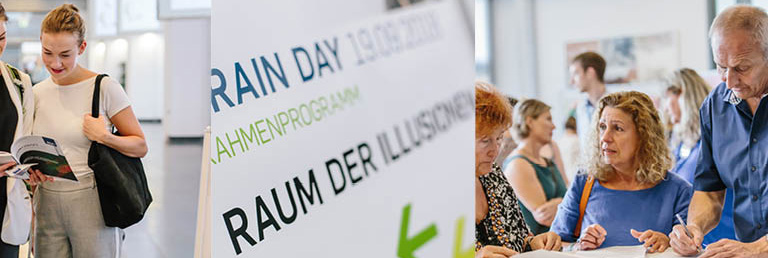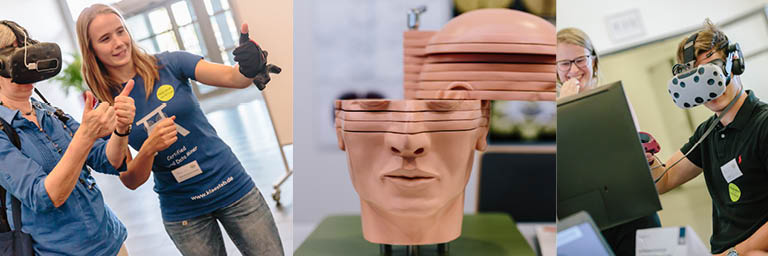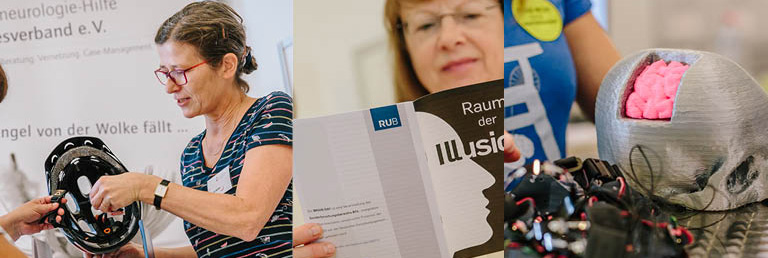BRAIN DAY 2022 – PROGRAMME

From fundamental research to therapy
A day with a focus on Bochum’s neuroscience with lectures, information stands and activities: 14.09.2022, 1pm to 5pm, RUB Conference Center
PROGRAMME
| 13:00 | BEGINNING OF THE SUPPORTING PROGRAMME Presentations of support groups Activities to join in |
| 13:30 | WELCOME AND OPENING Prof. Dr. Denise Manahan-Vaughan, Speaker of Collaborative Research Centre 874, Ruhr-Universität Bochum |
| 13:45 | POST-COVID – Between Delusion and Reality Prof. Dr. Martin Tegenthoff, Neurologische Universitätsklinik und Poliklinik, BG-Universitätsklinikum Bergmannsheil; Faculty of Medicine, Ruhr-Universität Bochum |
| Read more 200 years ago, Goethe was already of the opinion that humans can only perceive themselves as a whole if their senses are interconnected and communicate with each other. Now modern brain research allows us to understand the mechanisms of these connections of the human senses, which we use unconsciously in everyday life, for example when we get the right key out of a trouser pocket. The lecture gives an insight into the ability of our brain to overcome sensory boundaries, for example, when learning. | |
| 14:15 | THE POWER OF NEUROTRANSMITTERS – How a happiness hormone influences our memory Prof. Dr. Olivia Masseck, Synthetic Biology, Faculty 2 – Biology/Chemistry Universität Bremen |
| Read more What actually are neurotransmitters and how can neuroscientists make them visible and change them in the brain? In her lecture, Prof. Dr. Olivia Masseck gives an insight into the different transmitter systems and explains how they are connected to our memory. Using serotonin as an example, the Brain Day guests will learn how memory performance can be studied in animal models and what new developments there are in research. | |
| 14:45 | COFFEE BREAK + SUPPORTING PROGRAMME |
| 16:00 | TRAUMATIC MEMORY TRACES IN THE BRAIN Prof. Dr. Nikolai Axmacher, Neuropsychology Institute of Cognitive Neuroscience, Faculty of Psychology Ruhr-Universität Bochum |
| Read more Painful feelings, thoughts or sensory impressions are suddenly back, uncontrollable, a certain key stimulus is enough. Involuntary memories of traumatic events and situations – so-called intrusions and flashbacks – are among the most important symptoms of various mental illnesses, especially post-traumatic stress disorder. They are very special, pathological forms of memory. But what are their neuronal mechanisms and how do they differ from “normal” episodic memory? The lecture will present some new studies that investigate this question with the help of imaging techniques in humans. | |
| 16:30 | HOW SCENTS SHAPE OUR MEMORIES Prof. Dr. Denise Manahan-Vaughan, Speaker of Collaborative Research Centre 874, Department of Neurophysiology, Faculty of Medicine, Ruhr-Universität Bochum |
| Read more The smell of vanilla wafers boosts spirits and sales at every summer festival. On the other hand, the hearty smell of cabbage rolls makes some people flee. How is it that smells have such an influence on our feelings, thoughts and actions? Prof. Dr. Denise Manahan-Vaughan reports on her latest research findings from the world of scents. An exciting journey from the olfactory bulb to the limbic system – the functional unit to which the control of emotions is attributed. When a smell is perceived, various areas of the brain are involved in processing it, even if we are not consciously aware of this process. Thus, in addition to the olfactory centre, regions responsible for emotions and value perception are also active and work closely with the brain’s reward and aversion systems. This process shapes our memories, sometimes forever, and in turn helps us to recall old, often supposedly forgotten memories after a long time. Thus, olfactory experiences help to capture the context and even the emotions of an experience forever. This is made possible by a direct, unique information pathway between the olfactory system and our most important memory organ, the hippocampus. | |
SUPPORTING PROGRAMME

Get into conversation with the neuroscientists at the Ruhr-Universität Bochum:
Why is chilli burning and why is mint cold? The skin is the largest human organ and we constantly perceive our surroundings with it. Functional disorders or diseases that impair the sensation of various temperature and touch stimuli can have consequences for our everyday functions – even leading to the development of nerve pain. With tangible examples relevant to everyday life, various aspects of temperature, touch and pain perception are explained in a comprehensible way and can be experienced vividly with small experiments.
How do stress hormones influence our memories? Find out from the researchers of the Department of Cognitive Psychology. Gain new insights into the way our brain functions under stress and learn how to objectively measure stress reactions. You want to know what ice water, math problems and people in white coats have to do with all this? Find out and slip into the role of a test person yourself at the Brain Day.
Why are we able to classify unknown objects into meaningful groups? In order to find an answer to this question, members of the working group “Neural Foundations of Learning” have developed abstract categories. Try out for yourself how well you can classify the so-called “RUBubbles” and find out what we can learn from corvids on this topic.
The Knappschaftskrankenhaus Bochum is researching, amongst other things, how “virtual reality” can be used to diagnose or rehabilitate movement impairments – caused, for example, by Parkinson’s disease or stroke. Test your motor skills with 3D video glasses and motion sensors during a virtual visit to a computer-generated reality.
Where are hippocampus, cerebellum, or pituitary gland? Members of the Institute of Anatomy, Department of Cytology, will help you get oriented in the brain. Discover the most astonishing human organ under the microscope, through exhibits, and diagrams.
The Faculty of Sport Science presents a hands-on course on the topic of “Sensorimotor Coordination and Information Processing”: Test your reaction ability, hand strength and muscle activity or your ability to balance. Get to know current wearables and APPs in this field. Or try exercises to improve coordination such as the “balance trainer” or the “coordination ladder”. Learn how sports science scientifically examines movement and coordination.
INFORMATION STANDS OF THE SUPPORT GROUPS

- Alzheimer Gesellschaft Bochum e.V.
- Autismus-Terapie-Zentrum Dortmund/Hagen
- Der Paritätische, Selbsthilfe-Kontaktstelle Bochum
- Gesichtsfeldausfall-Selbsthilfegruppe Niederrhein
- Selbsthilfegruppe Epilepsie Essen
- Selbsthilfegruppe Schlaganfall Ratingen e.V.
REGISTRATION
Participation is free of charge. Please confirm your attendance via
Sfb874-pr@rub.de or phone: 0049 (0)234 32-26603 (Monday to Thursday, 9.00 a.m. to 2.00 p.m.)
DIRECTIONS
Public transport: subway U35 exit “Ruhr-Universität Bochum”, enter through Mensa (university cafeteria). Download detailed directions here (in German).
Arrival by car: The car parks at the RUB are currently being renovated. There may be closures and short-term diversions. Please note the CAMPUS MAP with restrictions on use.
General information on how to get to the Ruhr-Universität Bochum you can find here.
